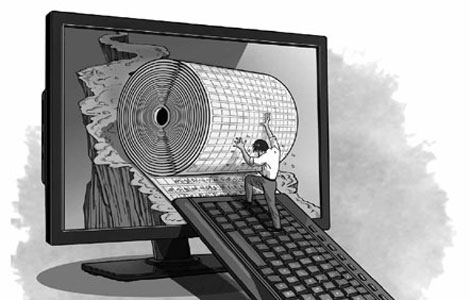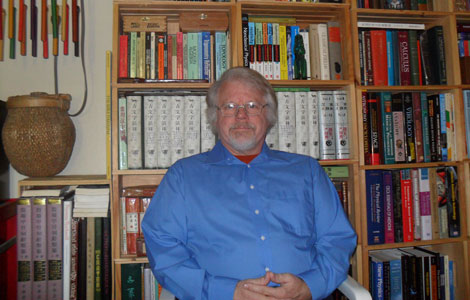Life in the village is hard but warm
Updated: 2013-10-10 07:23
By Zhang Yue (China Daily)
|
||||||||
I spent two nights in Boduoluo village trying to talk to the villagers about their life and thoughts, with a few other reporters and Oxfam staff. The first day was spent in the old village director Liu Zhengkun's house, and the second day in villager Liu Zhengwei's place with three other reporters.
It was my first time living in a village, with limited electricity in the evening, and completely no mobile signals.
Before visiting, Oxfam staff warned us about how rocky the road can be, and asked us to buy a pair of hiking boots before we came.
It was a long and slippery road indeed, especially after rain. And climbing a mountain with an altitude of 3,200 meters is so different from my hiking experiences in Beijing. I did not dare to walk too fast, as I could not catch my breath.
In the second evening, we had hotpot for dinner, and we were persuaded to have some white liquor, or baijiu. I took two shots. On my way back to Liu's home that night, which was located further up on the mountain, my heart pounded so crazily like it was going to jump out of my body. I was overcome with fear.
"It was very dangerous to climb the mountain after drinking baijiu," Yu Xiaogang said, adding that I should slow my steps down. "I did this last month, and I could hardly catch my breath when I was climbing."
I took a glance at Liu. He walked fast and vigorously, even after many shots of liquor. What's more, to make our journey easier, he carried our luggage, mine and the other reporters'.
Even though it was September, it was already very cold and wet in the mountain after days of raining. After 30 minutes climbing, I was all wet and exhausted.
That was when Liu and his wife shouted to us from her kitchen: "Hey! Come and join us, gather around the fire."
This is a common way for local people to warm themselves, by having a large iron circle fixed in the middle and burning firewood. Very soon afterwards, the whole kitchen was filled with heavy smoke. My eyes were hurting, as were everyone's. For the two evenings, that was how we spent time with the villagers and had evening chats with them.
The second day as I was leaving the village, my right eye was aching so much that I could not even open it. I rushed to the nearest hospital in nearby Lijiang. The doctor told me that my eye keratitis was recurring because of the heavy smoke.
Funnily enough, several other reporters also went to the hospital after we ended the visit, for some other reasons such as leg injury or flea allergy. "Maybe the flea knows that you are strangers, and they attack you," Liu joked.
Liu and his wife were worried about my eyes as he noticed my discomfort.
"When we have more money, and conditions get better, we will have better heating so that you won't suffer like that," he said with guilt.
Liu's priority at the moment is leading the village's tourism group to build the village into a better tourism destination, including building better accommodation facilities for the travelers.
Yet when we returned to the ancient town of Lijiang, and lived in a newly refurbished inn in the crowded town, I missed Boduoluo village.
For me, though painful and hard, it was the only way that I could learn about real rural China where ethnic people live: the hard and simple conditions they have been living in for generations, the strength they have nurtured on this land, and the genuine love and honesty when offering help, all for nothing in return.
(China Daily 10/10/2013 page20)

 Victoria Beckham S/S 2014 presented during NYFW
Victoria Beckham S/S 2014 presented during NYFW
 'Despicable' minions upset Depp's 'Lone Ranger' at box office
'Despicable' minions upset Depp's 'Lone Ranger' at box office
 'Taken 2' grabs movie box office crown
'Taken 2' grabs movie box office crown
 Rihanna's 'Diamonds' tops UK pop chart
Rihanna's 'Diamonds' tops UK pop chart
 Fans get look at vintage Rolling Stones
Fans get look at vintage Rolling Stones
 Celebrities attend Power of Women event
Celebrities attend Power of Women event
 Ang Lee breaks 'every rule' to make unlikely new Life of Pi film
Ang Lee breaks 'every rule' to make unlikely new Life of Pi film
 Rihanna almost thrown out of nightclub
Rihanna almost thrown out of nightclub
Most Viewed
Editor's Picks

|

|

|

|

|

|
Today's Top News
Trending news across China
Americans to name panda cubs at Atlanta zoo
US investors say they are less bullish on China
Obama remarks show China high on agenda
Hong Kong benefits from rising renminbi
WB chief praises China for reforms
China is a major contributor to global growth
China, Australia agree to quicken FTA talks
US Weekly

|

|








